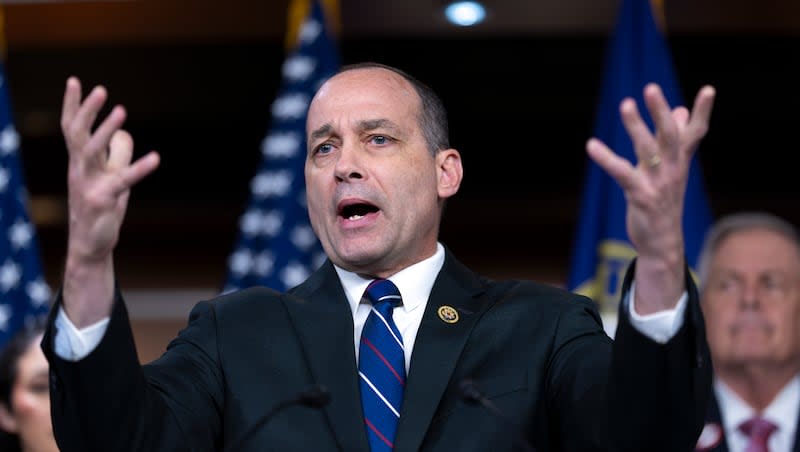Former House Speaker launches campaign to unseat lawmakers who removed him

- Oops!Something went wrong.Please try again later.
Several frustrated House Republicans are breaking with congressional norms to boost the primary opponent of House Freedom Caucus chairman Bob Good.
The Virginia Republican was one of eight lawmakers who voted to remove their party’s leader, former House Speaker Kevin McCarthy, in October. McCarthy, who resigned in December, now plans to return the favor.
McCarthy, and his friends on the Hill, including House Armed Services Chairman Mike Rogers, R-Ala., and Rep. Derrick Van Orden, R-Wis., have endorsed and fundraised for Good’s primary challenger, state Sen. John McGuire, CNN reported on Sunday.
The delayed fallout from the removal of McCarthy forms part of a larger battle over how Republicans approach policymaking in the House.
Who voted to remove McCarthy?
“You’ve got a struggle inside the Republican Party,” veteran political consultant Casey Phillips told the Deseret News.
The divide exists between “the establishment ... or mainstream types,” who often come from swing districts, Phillips said, and “the folks that don’t understand what that’s all about, who get to run in safe districts and get to throw bombs.”
“And it’s really fun to throw bombs when you don’t have to deal with the consequences,” Phillips said.
But the electoral consequences of unseating McCarthy are coming back to haunt more than just Good. Rep. Nancy Mace, R-S.C., and Eli Crane, R-Ariz., have also been designated as targets for McCarthy’s primary operation, Politico reported in February.
“The reason the powers that be — former Speaker McCarthy and his allies — are trying to exact revenge against those that stood against him is because (Crane) disrupted the power structure of D.C. It was the first time that had happened,” a person close to Crane told the Deseret News on the condition of anonymity.
As a freshman lawmaker representing northern Arizona, Crane has stood out by embodying the ethos of the House Freedom Caucus. From his first week in office, when he became the only newcomer to oppose McCarthy in all 15 rounds of his speaker’s race, Crane has refused to go along with the majority of his party, instead siding with Freedom Caucus members to leverage the GOP’s narrow House majority to exact concessions and reform the spending process.
Representatives in the group, which include Brigham Young University alum Andy Biggs, R-Ariz., and Florida Republican Matt Gaetz, spearheaded the unprecedented step to oust the speaker in protest of his bipartisan deal to fund the government. The move paralyzed the chamber for three weeks until Rep. Mike Johnson, R-La., was elected as speaker and made the “Gaetz eight” something of a pariah coalition within the Capitol.
But Crane didn’t go to Congress to make friends. “He thinks that more people need to be willing to cast votes that might cost them their jobs,” the source said. “That approach makes a lot of people feel uncomfortable because for far too long this town has just gone along to get along and he thinks that that’s why we’re $34 trillion in debt and that’s why the border’s a crisis.”
Eli Crane faces a primary challenger in Arizona
In March, former Yavapai County supervisor Jack Smith filed to challenge Crane in the state’s 2nd Congressional District Republican primary. A month earlier, Crane told Politico he was aware of attempts to recruit a primary opponent for him. He said “common sense” led him to believe McCarthy was behind it.
Crane’s decision to help oust McCarthy came as a blow to the former speaker because a McCarthy-backed PAC was key to Crane’s election victory, Politico previously reported.
But regardless of how he got there, Crane has often opposed Republican leadership in the House.
During Congress’ months-long battle to pass a budget for 2024, Crane repeatedly called for lawmakers to use the threat of a partial government shutdown to demand more substantive spending cuts from the Democratic-led Senate and White House.
On Tuesday, Crane joined fellow Freedom Caucus members, including Good and Biggs, in introducing the Nuclear Family Priority Act, which would limit who can qualify for a family-sponsored immigrant visa to prevent so-called “chain migration.”
“(Crane) thinks that the time is now to start taking bold stands to change the trajectory of those issues or else we’re going to do irreparable harm to our country,” the source said.
Crane has endorsed Good in his 2024 reelection bid. Last week, members of the House Freedom Caucus, including Gaetz, Biggs and Rep. Chip Roy, R-Texas, gathered in Virginia’s 5th Congressional District to also lend their support to the chairman.
But whether GOP voters have an appetite for more messy disruption in Washington, D.C., remains to be seen.
“The Republican primary voters are going to have the ultimate say,” Phillips said. “It’ll come down to where the Republican Party wants to head in those districts.”

